The Best Speculative Poetry is Intersectional
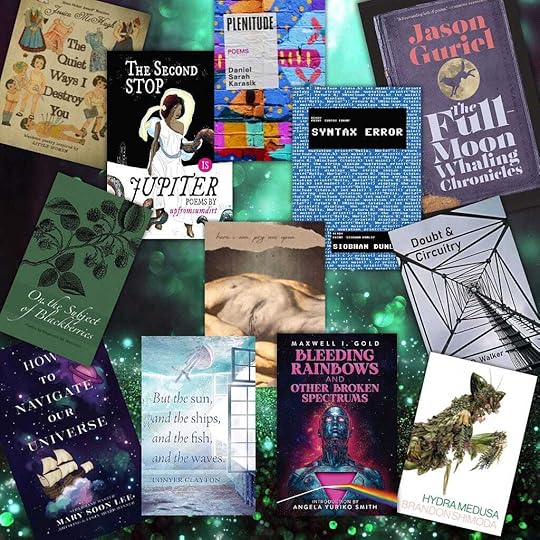
This is my sixth year reviewing books from the SFPA (Science Fiction and Fantasy Poetry Association) Elgin Award for best speculative poetry book. A full list of nominated books is available on the SFPA website. This year’s award chair is Felicia Martínez, who I would like to thank for diligently tracking nominations.
Here are my previous reviews:
The Best Speculative Poetry of the Year is ExplosiveThe Best Speculative Poetry of the Year is EpicThe Best Speculative Poetry is Creepy AFThe Best Speculative Poetry Engages in Experimental FormsSpeculative Poets Renegotiate Femininity & the StrangeAbout the Awards: The Elgin Awards, named for SFPA founder Suzette Haden Elgin, are presented annually by SFPA for books published in the preceding two years in two categories, Chapbook and Book. Chapbooks must contain 10–39 pages of poetry and books must contain 40 or more pages of poetry. E-books are eligible, as well as print. Books that won first–third place in the previous year’s Elgin Awards are ineligible. Single-author and collaborative books are eligible; anthologies are not. Books containing fiction as well as poetry are not eligible. Books must be in English, but translations are eligible. In the case of translations that also contain the poems in the original language, those pages will not count toward the total page count. Nominated books must be made available to the Chair upon request to remain eligible.
Thoughts on This Year’s BooksI am reminded how fragile this genre is by the smallness of this year’s list. Each year, I focus my reading for the year on speculative poetry because it is a genre I love and write myself — and 2024 was a year where I struggled to find books that fit the genre. It’s not just that the pandemic decimated many small presses — but I think it’s just that the writers who are publishing are juggernauts. Whatever the reason, I continue to hope to see more speculative poetry, and I remain dedicated to celebrating the genre.
Each year that I review the SFPA Elgin Award nominated books, I find myself bemoaning the resources of small presses. There are so many books on this list from small presses that could benefit from more reader support to increase the distribution and circulation of these fine titles. Speculative poetry is already the red-headed stepchild of SFF: It is only in 2025 that a major science fiction and fantasy award is recognizing poetry (the Hugo Award — and we do not yet know if its new poetry category will be permanent to the subsequent awards). As a new member of SFWA (Science Fiction Writers of America), I joined with the sole intent of becoming a part of the poetry movement, and as a co-chair on the SFWA poetry committee, our first goal was to create a poetry Nebula Award. I have some small hope, therefore, that poetry will soon become a recognized genre of speculative writing.
While the SFPA is full of talented and kind writers, as well as dedicated volunteers, as an organization, its reach is limited. Poetry itself is often seen as second-class to more popular genres of fiction or memoir. The reality is that speculative poetry is a thriving and important genre, and I for one remain committed to supporting the many fabulous books published each year that receive so little well-deserved acclaim.
I enjoyed all of the books from newer press Kith Books, which has many titles on this year’s nominee list. Everything from there is worth reading!
One thing that strikes me about this year’s books is how intersectional they are — not just feminist, but chronically ill; not just black but queer; not just speculative, but a kaleidoscope of ideas, identities, and themes. Speculative poetry truly has upped its game.
How I Create This ListHow do I pick books for this list? This is merely a recommended reading list, not a “best of” list because the list I am pulling from is the nominated works from the SFPA membership. My primary concern is highlighting works I feel deserve more reads. I tend to skew heavily feminist, focusing on writers of color, LGBTQIA+ voices, and disabled poets. The list is subjective to my tastes. I spend less time on men (cis-gendered, heterosexual) because those voices have enough support. I always make a Goodreads list of the total nominated works, which you can access here.
Lastly, in the past, there has been some (IMHO short-sighted) discussion as to whether such lists are “bad” because they skew members’ voting towards one work or the other. I find this difficult to believe because I review a huge number of books selected for the Elgin. I also believe the SFPA membership has enough independent thought to be able to do their own voting. The list is not to highlight those works I think you should vote for but to highlight the amazing works nominated each year and lift up the endeavor as a whole. Vote as you see fit.
One more note: I am writing from my perspective. If I make an error, please comment or message me. I never want to misrepresent a work simply because I misread it. Also, this list contains works I wrote or edited. I feel poets should be vocal about promoting their work, but if this bothers you, you can scroll on past.
A frustratingly necessary note for 2024: I don’t review books that use LLMs/AI in the art or text, nor do I support authors who support those programs. It has become increasingly clear that the companies who run those softwares have massively infringed on the copyrights of artists, authors, and creatives. While I believe poetry can explore the juxtaposition between technology and art, and I would be interested to see an author actually subvert the outright theft and blatant disregard for creative capital these programs and their owners exploit for mass profit, I have yet to see that happen.
Chapbooks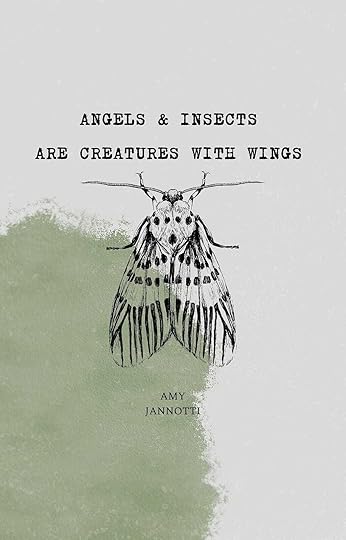 Angels & Insects Are Creatures with Wings (Kith Books 2023)
Angels & Insects Are Creatures with Wings (Kith Books 2023)by Amy Jannotti
The reader’s first encounter with Jannotti’s style comes in the formatting of the Table of Contents, which separates the book into two sections: “Vermin” and “Divine” — with an introductory poem before both “A Common Ancestor, Clipped”. Here, the book’s main focus on the dichotomy between what is beautiful/holy and what is ugly/horrific is established. Forms vary from prose poems to free verse couplets, while the content itself is primarily body horror with a personal, confessional point of view. The speaker is female, presumed weak, broken — entirely focused on survival, which is, after all, the primary mechanism by which femininity exists, particularly in horror as a genre. From terrariums to knives, Jannotti’s raw lyricism and fresh turns of phrase make this little, sharp book a worthwhile read.
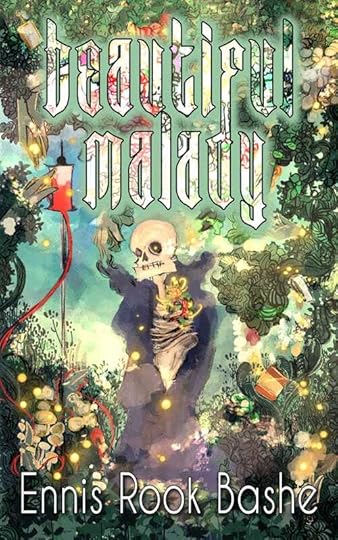 Beautiful Malady (Interstellar Flight Press, 2023)
Beautiful Malady (Interstellar Flight Press, 2023)Ennis Rook Bashe’s collection of cripspec poems merges the dream world with the harsh realities of living in a broken body. At once heartbreaking and curative, Bashe’s work explores disability and chronic illness in ways not yet celebrated in speculative poetry. Bashe pulls no punches: Living in the disabled/chronically ill body is not a fairy tale. But these poems still give us hope as readers — through the beauty of the fantastic. Read Julie Reeser’s interview with Ennis Rook Bashe. Listen to Ennis read from Beautiful Malady.
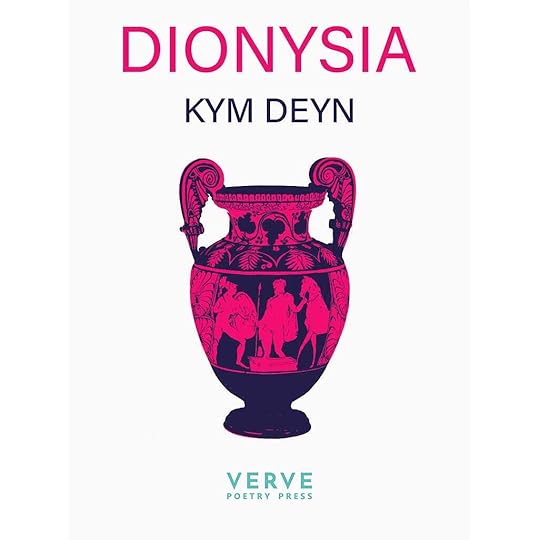 Dionysia (Verve Poetry, 2023)
Dionysia (Verve Poetry, 2023)by Kim Deyn
Queer poet Kim Deyn’s cheeky retellings of male historical figures (Alexander the Great and Odysseus) join the pantheon of queer reimaginings of Greece and beyond in recent publications (See: Enkidu Is Dead and Not Dead / Enkidu está muerto y no lo está: An Origin Myth of Grief by Tucker Lieberman and anOther Mythology by Maxwell I. Gold). Despite my desire to see more Greek/Roman myths and histories told by people native to those places, centering queerness in relationship to those stories feels like a necessary conversation in today’s context.
The book is split into two parts: “Alexandros, or, the first play,” which focuses on Alexander the Great — and “Night Interludes, the second play,” which explores Odysseus. Deyn draws on their playwriting experience to format the book in a found form of a stage drama. The flippant framing of characters is delightfully camp — Alexander is “prettyboy, wine-drunk, divine.” Despite focusing on male figures, the work is still feminist in its inclusion of female historical figures: “I put the sister in this because I want the impossible because grief makes madwomen of us because once she arrived she wouldn’t leave and swims in this poem like a goldfish in a bowl”. This is a richly dense book that belies its length.
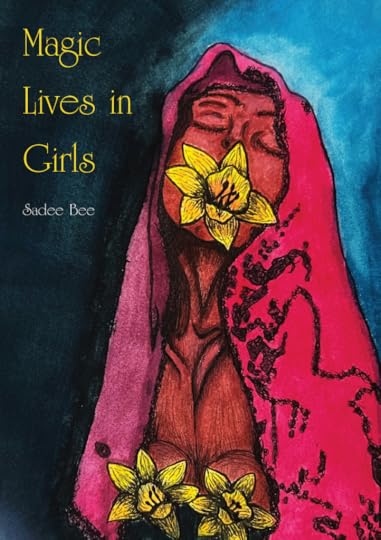 Magic Lives in Girls (Kith Books, 2023)
Magic Lives in Girls (Kith Books, 2023)by Sadee Bee
“Womanhood a construct / Femininity, a choice and a curse /”
Queer Poet and Illustrator Sadee Bee’s chapbook falls into what Arielle Greenberg termed the “Gurlesque”: “The words of the gurlesque luxuriate: they roll around in the sensual while avoiding the sharpness of overt messages, preferring the curve of sly mockery to theory or revelation‟. It’s no wonder the main inspiration was Florence + The Machine. Bee strings together the memories of a speaker who is drawn to graveyards in a dark exploration of self that ruminates on the loss of innocence brought about by the trauma of growing up female. What might be overwrought metaphors like the moon for femininity in the hands of a lesser poet are reclaimed in dense prose and free verse poems that emphasize discomfort in long lines punctuated by brokenness. (Will someone please write a book on the contemporary poem’s use of the slash already?) Sadee Bee embraces the magic of girlhood through a dark lens.
“I have learned there is beauty in the brokenness. I am my own Sun, my own / Moon, a wondrous solar system within myself. I am the universe born anew, my / own evolution; a forceful shift in orbit since leaving the womb.”
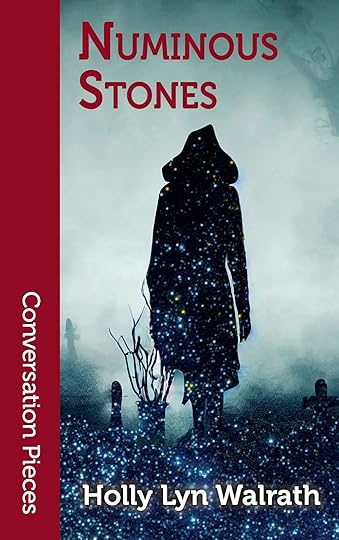 Numinous Stones (Aqueduct Press, 2023)
Numinous Stones (Aqueduct Press, 2023)I’m delighted that the SFPA membership chose my chapbook, Numinous Stones, for inclusion on the Elgin nominee list. Written entirely in pantoum form, this book was a grief outlet for me after the death of my father. It was also nominated for a Bram Stoker Award this year. Here is the book’s description:
From Elgin Award winning author Holly Lyn Walrath, a haunting collection of poetry about grief and the sacred that digs deep beyond a fairytale world into the grave. Told in the circular pantoum form, Numinous Stones is a poetic graveyard littered with horror — from sentient scarecrows to silent skeletons to scorched sacred spaces. As each line repeats, new meaning gleams like bones unearthed in a shattered realm of monsters, dark forests, and dusty ghosts.
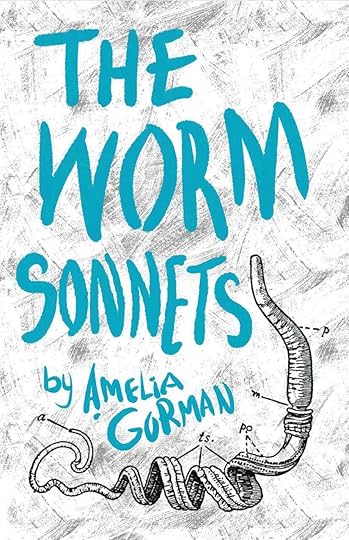 The Worm Sonnets (Quarter Press, 2023)
The Worm Sonnets (Quarter Press, 2023)Modern-day speculative naturalist Amelia Gorman brings her love of all things weird to the humble worm: A subject she first focused on in her debut chapbook and previous winner of the 2022 Elgin Award, Field Guide to Invasive Species of Minnesota (Interstellar Flight Press, 2021.) The Worm Sonnets also calls to mind the field guide with its richly illustrated pages. But the visual images are only surface dressing on a delightful array of ghosty, wormy poems exploring the strange denizens of Worm World. Gorman’s poetry is an excellent example of contemporary ecopoetry — intersectional in placing the quintessential ghost girl at the center of that genre. While I’m not generally a lover of rhymed poems, Gorman’s sonnets are subtle enough that the form works well, and each poem is satisfyingly well-turned. It’s a shame this book is not available in wider distribution. Read Julie Reeser’s interview with Amelia Gorman.
Books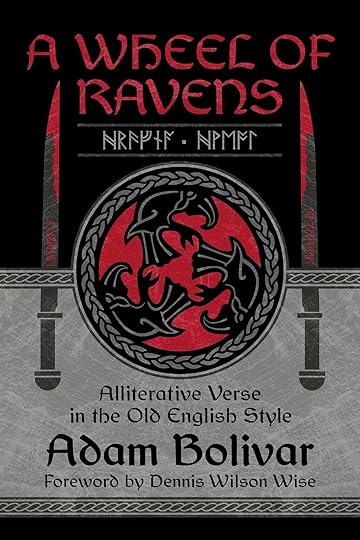 A Wheel of Ravens (Jackanapes Press, 2023)
A Wheel of Ravens (Jackanapes Press, 2023)by Adam Bolivar
As an Engish Major, I feel I would be remiss if I didn’t mention this absolutely bonkers and complex collection of alliterative verse (think Beowulf). Dennis Wilson Wise, PhD at the University of Arizona, provides a valuable foreword to what is likely to be a challenging read for most readers unfamiliar with Old English tales. That being said, I’ve always found this style to be one of the most accessible forms of ancient poetry. I still advocate for readers new to the works of Anglo-Saxon England to try Beowulf, as it remains surprisingly readable, and there are a number of famous translations (Tolkien, Seamus Heaney, and, in 2020, Maria Dahvana Headley, to name a few). However, Bolivar’s work stands out as it is both an entirely new collection of invented alliterative poems and unique as it is short poetry (a series of individual poems) vs. an epic poem.
Bolivar makes meticulous use of the alliterative form, and its constraints; most interesting to modern readers is likely the caesura, a break in each line that may feel familiar to experimental poetry in its use of white space. The content of the poems is satisfyingly weird — merging themes from Weird Poetry as a genre (primarily Lovecraftian in imagery) with familiar mythological tropes like witches, vampires, and dragons. These are not contemporary poems. Instead, Bolivar seems to have channeled the bards of old to give voice to an entirely new imagining wrapped in old verse, which is a feat to be celebrated.
 anOther Mythology (Interstellar Flight Press, 2023)
anOther Mythology (Interstellar Flight Press, 2023)Gold’s weird retellings of world myths explore the ancient stories through a queer perspective. Gold has a talent for the prose poetry form, which is often underutilized in speculative poetry but makes for a fantastic form of narrative sequence. Poems like “Drag, Queen of the Underworld” and “The Myth of the Closet” pair camp sensibilities with Weird Fiction tropes, subtly subverting the sometimes-problematic past of cosmic horror. If you love mythology and are looking for queer retellings, this collection is for you. In comparison to Gold’s other book on this list, this chapbook is a somewhat lighter foray into the strange queer landscape of the mythic. Listen to Maxwell I. Gold read from anOther Mythology. Read an interview with Maxwell I. Gold at Interstellar Flight Magazine.
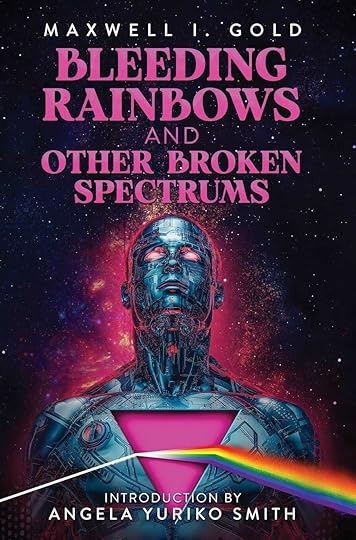 Bleeding Rainbows and Other Broken Spectrums (Hex Publishers, 2023)
Bleeding Rainbows and Other Broken Spectrums (Hex Publishers, 2023)It is rare to see an author with three books nominated on the SFPA Elgin Award list (it would be fascinating to do a study of the number of authors who have received this honor), but Gold’s book of erotic cosmic verse is a worthwhile addition. Primarily prose poems and free verse with use of white space, Gold’s book dives into a world of “Monsters, Jock-Queens, and Rainbow Gods”. The poems are paired with fantastic illustrations by artist Martini, primarily a comic artist, who here invokes the imagery of comic artist Dave Gibbon’s Doctor Manhattan from Watchmen (1986–1987) — a giant, nude blue man floating in space. I would argue that it is also rare to see such a complexly erotic book recognized by the SFF community. Gold dives into the dark side of queer sexuality, exploring the power dynamics of love and lust. I particularly enjoyed the collection’s sense of narrative arc, like a mythical journey the speaker embodies through pain to triumph. This is, at times, challenging material (at least for readers outside of the queer community) but deftly handled by a skillful poet.
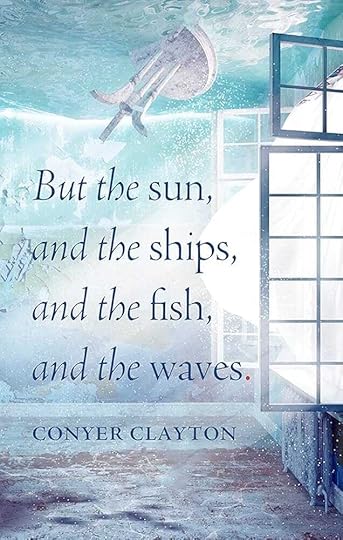 But the sun, and the ships, and the fish, and the waves (Anvil Press, 2022)
But the sun, and the ships, and the fish, and the waves (Anvil Press, 2022)French poet André Breton, founder of the surrealist movement, defines the genre as: “Pure psychic automatism [unconsciousness] by which we propose to express — either verbally or in writing or in some other manner — the true functioning of thought. The dictation of thought, in the absence of all control exercised by reason, outside all aesthetic and moral preoccupations… Surrealism rests on a belief in the superior reality of certain forms of association neglected until now, in the omnipotence of dream, in the disinterested play of thought.”
Which is to say, the best surrealist poetry relies on unconscious connections — a strangeness that comes from the juxtaposition of unexpected elements that the subconscious stitches together. A fantastic example of this in poetry is found in Conyer Clayton’s poem “Self-Made,” which starts with a woman finding a beetle in her hair and seeing a doctor who reels in a TV that is playing a Wild West scene where a horse eventually explodes into beetles. These images feel random, but put together, they form a sense for the reader of the utter strangeness of navigating the healthcare system as a woman.
Clayton’s book, primarily composed of prose poetry, is a beautiful example of contemporary surrealist poetry, blending dream with startling image and subconscious metaphors. Two sisters form the heart of the book’s narrative as they navigate life through a strange landscape of insects, ghosts, pollution, vampires, sinister men, and demons.
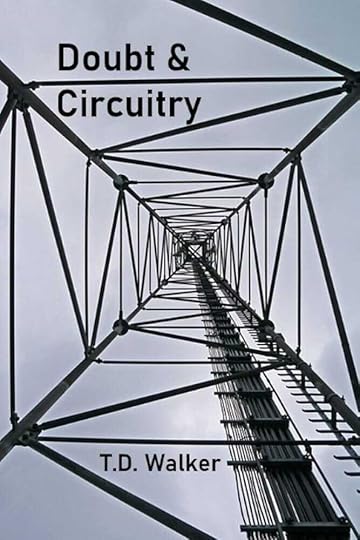 Doubt & Circuitry (Southern Arizona Press, 2023)
Doubt & Circuitry (Southern Arizona Press, 2023)By T.D. Walker
T.D. Walker is a shortwave radio enthusiast, and her obsessions are showing in this collection of pandemic-rooted abstract poems. Walker combines the history of the US Emergency Broadcast System, Cherynobl, and the 2020 pandemic into poems that ask the hard questions of what it means for a people to be at the whim of their government and politics. In the author’s note, she says, “‘Chernobyl 1986 / COVID 2021’ began as a question: how did the disasters of the 2020s shape my children’s view of the world, particularly in light of their disconnect from the world? And my own? How would they begin to function within the world again?”
We are still grappling with these questions in a world where we are told the pandemic is over, but COVID is still a daily part of our lives. Walker takes us back in time to a place where nuclear war was an imminent threat — using the radio as a tuner to the past. Near rhymes give the collection an eerie tone, as well as the surreal images of birds, plants, viruses, decay, and magma — juxtaposing nature (and its impacts from humans) with scientific research. A fascinating, meticulously crafted read.
 Here I am, Pry Me Open (Kith Books, 2023)
Here I am, Pry Me Open (Kith Books, 2023)St. Cloud’s punk-rock-trans-angst-fest treat opens with a quote from the band Against Me! an early 2000s American punk band led by singer and guitarist Laura Jane Grace, who came out as a trans woman in 2012: “C’mon, shapeshift with me, what have you got to lose?” It’s giving Hedwig and the Angry Inch for a new era.
The book opens“Before the Incision” and focuses on childhood, beginning with the speaker at age 12–24 in “Notes to a 12 Year Old Optimist,” which deals with the trauma of body dysphoria during puberty and the subsequent teenage years. St. Cloud explores themes of growing up religious, childhood games, dolls, and aliens through the lens of transness. These poems sizzle, particularly in their fairly snarky titles (“An Alien Went Through Me & All I Got Was This Stupid Reality”, “Local Fairy Forgets Common Colloquialism — Word Stew Follows”, “Are You Not Entertained”, “Taco Hell Condemns Thee”,” “Therapist That” to name just a few delightful examples), but also in the raw, nervy, punk rock honesty that drives the speaker on and on. This is a must-read for us awkward emo kids who grew up hating our bodies and ended up living life like a primal scream.
If you believe queerness and otherness are inherently strange, this book is for you. To me, this book could be read as a foray into the new speculative memoir genre of poetry, and I, for one, am Here For It.
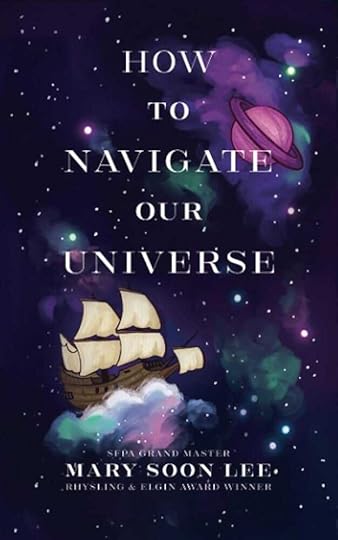 How to Navigate Our Universe (Self-Published, 2023)
How to Navigate Our Universe (Self-Published, 2023)Every time I see Lee’s name on an award list, I just know everyone else is doomed. Mary Soon Lee’s self-published poetry collection is entirely made up of “How To” poems, with the exception of “Part V Space Dust”, which has 15 poems of varying titles. “Part I Our Backyard: The Solar System” journeys through our solar system with planet by planet personified in haiku and short poems that touch on the tropes of those celestial bodies. These are science poems (See Mary Soon Lee’s excellent previous collection Elemental Haiku: Poems to honor the periodic table, three lines at a time, Ten Speed Press, 2019), but they are at once accessible and heartbreaking. “How to Thank Earth” stands out as a beautiful ode to our home planet: “When you are grown, / when you leave for the stars, / write home.” Lee is excellent at staying on theme and a devastatingly prolific poet of our generation. I’m not sure what it is that makes these poems so good, whether it’s their simplicity or their beauty, but I wish they bottled it so I could have it for breakfast every day, preferably somewhere on a distant planet, far from the troubles of This One.
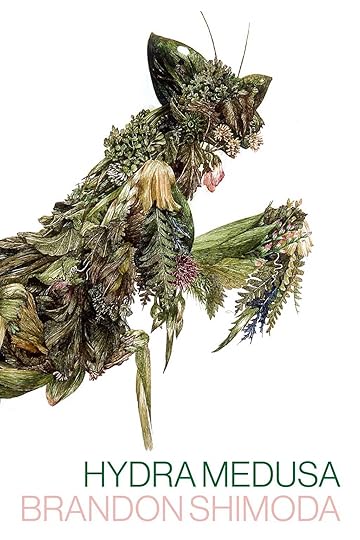 Hydra Medusa (Nightboat Books, 2023)
Hydra Medusa (Nightboat Books, 2023)Brandon Shimoda’s hybrid collection will have you asking: “Is it poetry?” in the best way possible. Primarily made up of untitled poems (here using the convention of brackets and ellipses to indicate there is no title), Shimoda’s poems follow no particular form or structure, moving forward organically with white space on the page or dense passages of prose poetry. “The Descendant” could be a hybrid creative nonfiction piece about Japanese American Incarceration, but it carries none of the sensibilities of a traditional essay and instead moves and breathes on the page like a poem.
In an interview with Nightboat Books, Shimoda says about this hybridity:
“Hybridity, for me, is, less about form, more about emotions and the process of learning…The learning and the questions have, since then, not stopped. But it has not been linear. It has been messy, mercurial, amnesiac, repetitive, disjunctive, seismic, lonely. And yet it has taken me to many places, introduced me to many people, many of whom have become friends, important people in my life. But it has been chaotic. In other words, hybrid. And because writing has been central to that process, the writing has also been hybrid.”
Shimoda likens this hybridity to different species of the literary kingdom: “Prose is poetry. Maybe not poems, but poetry. I mean, I don’t know what poetry was, or what it was or is supposed to be, if anything, but for me it’s like poems and prose are different phyla of the poetry kingdom, different families of the poetry order.”
The very idea of hybridity is on trial here: “when confusion is shared / does it open onto anger / ?” “Where do youth feel safe?” “What is now, what is tomorrow?” Therefore, this hybrid collection of poem-prose blends the idea of learning (teaching, education, ancestral learning) with the ghost-manifested horror of the history of Japanese American Incarceration. It occurs to me that hybridity is also at the center of the speculative genres: Is Star Wars fantasy or space opera? Is the speculative a metaphor or reality reimagined? Is a poem ever truly speculative in the way a story is?
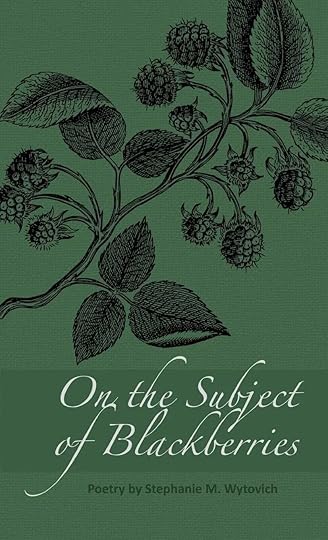 On the Subject of Blackberries (Raw Dog Screaming Press, 2023)
On the Subject of Blackberries (Raw Dog Screaming Press, 2023)There are certain fascinations familiar to women speculative writers and one of those is Shirley Jackson’s We Have Always Lived in the Castle, a story about two sisters who live in isolation. The book is many things: A story about chronic illness in the form of Uncle Julian, a story about isolation and anxiety, a slippery, stream-of-conscious, deeply interior look into the equally dark and light magic of girlhood, a book that new writers should absolutely read to learn how to shock a reader.
Wytovich’s collection is a cathartic release of poetry inspired by the author’s experience with postpartum depression. As the poet says, “I asked myself: what do I need to protect myself and my family? The answer, as it so often is, was poetry.” The poems in On the Subject of Blackberries are partially found from the pages of Jackson’s witchiest book, and such for a fan of the work, it’s a very valuable read. Beyond that, this series of untitled small poems lives on its own as a beautiful, interior set of wards that the reader can take in as their own. The illustrations in the book are thoughtfully chosen, and made me wish I’d bought the book in physical format. Gritty, honest, raw, and satisfyingly full of the grime of broken femininity, this book is a dark love letter to horror.
I also enjoyed the author’s notes at the beginning of the book, and hope that Wytovich one day considers writing a memoir.
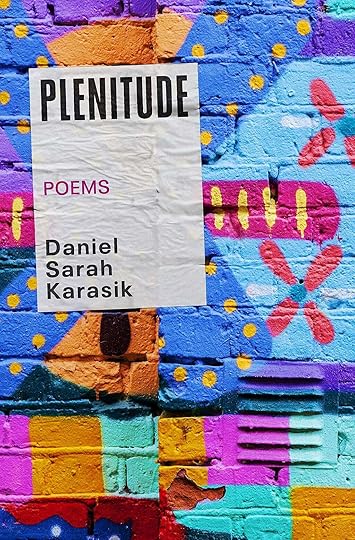 Plenitude (Book*hug Press)
Plenitude (Book*hug Press)In 2019, a transphobic speaker named Meghan Murphy (who has repeatedly insisted trans people don’t exist) was featured at the Toronto Public Library. In protest, trans and nonbinary authors formed a “read-in” that drew over 700 people who sat quietly and read books. In response, the Toronto Public Library trapped protesters and library attendees in the library.
One of the organizers was Daniel Sarah Karasik, a poet who writes urgently about this event and the topics facing queer, trans, and marginalized communities from a social justice lens. Plenitude opens with the epigraph/poem “messianic time” which places the book in conversation with a Utopian vision for marginalized people:
imagine there were no oppressio to shape our identities. instead:
limitless forms of descriptive difference not essentialized and
politicized by violence. if we were to say I in such a world, we might
mean almost nothing but a historied, futured, networked locus of
desire
The poem “stages of grief” particularly stood out to me: “1. in which / you believe / any and all / disclosure / of your pain / is a step / towards healing it” — a poem which acknowledges that our current world asks us to disclose our history to prove authenticity, arguing that today’s society monetizes any healing. This collection looks at some of society’s most devastating and broken structures — capitalism, policing, education, law, and politics — and imagines new versions that might serve the most vulnerable. Will this book win a speculative award for poetry? Well, “poetry about silence wins prizes,” — so I’m not sure the SFPA voting public or even the larger poetry community as a whole is ready to hold this kind of intersectional poetics, but at the very least, this book’s nomination brings these ideas to a wider stage. For Karasik, the speculative is “a genre that could help illuminate the ambivalences and tensions within abolitionist politics (that is, within those politics that work towards the overcoming of the state’s repressive institutions such as prisons and police)” (Interview in Open Book, 2024). It’s a fascinating juxtaposition, one which I hope to see explored more in speculative poetry.
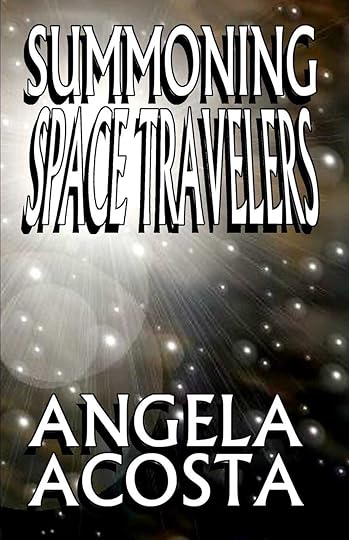 Summoning Space Travelers (Hiraeth Publishing, 2022)
Summoning Space Travelers (Hiraeth Publishing, 2022)Angela Acosta’s collection creates a conversation between themes of Latine/Latinx identity (a connection to the earth or “terra firma”, migration, honoring ancestors, Indigenous histories, language, home-cooked meals, etc.) with themes of space travel (space travel to new worlds or “terra incognita”, climate change, colonization, cellular therapy, the moon, etc.). Inherently, this lens applied to science fiction generates questions the genre has attempted to answer, but only from a certain viewpoint: What does it mean to leave a homeland for a colonized new world? How do people who are inherently wanderers approach the idea of escaping extinction? What does it mean that climate change disproportionately impacts marginalized people?
Written in a conversational and often self-referential tone, these poems ask the hard questions from a softer place of acceptance, allowing the reader to engage with the themes of the book while still acknowledging that everyone is searching for home, for acceptance, for adventure.
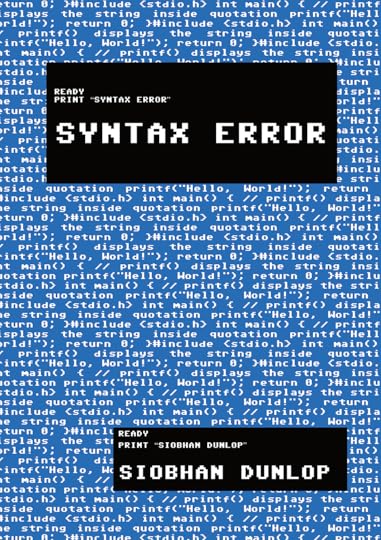 Syntax Error (Kith Books, 2023)
Syntax Error (Kith Books, 2023)The eponymous opening poem in Siobhan Dunlop’s collection “Syntax Error” tells the reader: “You’ve got to be very clear /because computers don’t understand / anything except on/off / ones and zeroes / binary;” setting up the idea that computers are fallible and humans “can be flexible.” Visual poems like “algorithm of the self” draw on the concrete poem tradition but are set in a technological world, wherein the form reflects the content. Dunlop juxtaposes the hard-and-fast rules of HTML and Dial-up internet with the fluidity of gender From PDFs to doomscrolling to textspeak, those who grew up in a DOS world will appreciate the late 90s-early 2000s nostalgia here, presented in experimental form poems that ask: “Does poetry have to go anywhere?” Satisfyingly on-theme and quippy, this collection is a must-read for anyone who appreciates a little coding humor.
The Border Simulator / El Simulador de Fronteras (One World, 2023)Gabriel Dozal (Author), Natasha Tiniacos (Translator)
It’s rare to see a translation on the Elgin Award list, and it’s no surprise that it comes from Spanish and by an author who is also the editor of one of my favorite post-modernism poetry publications, DIAGRAM. Set at the US-Mexico border, the highly experimental and almost figurative poems follow the story of a brother and sister, “Primitivo and Primitiva” (a word that in Spanish has many different meanings from the idea of the first peoples to uncivilized to original) who travel across the “simulated” border. This is an epic sequence of zombie poems that don’t adhere to any particular form — concrete poems are interspersed with free verse poems — but it is the author’s rejection of form that allows for a subversion that aligns beautifully with the book’s message. This is a complicated read and might take some study for readers new to this style of poetry, yet this does not detract from the experience.
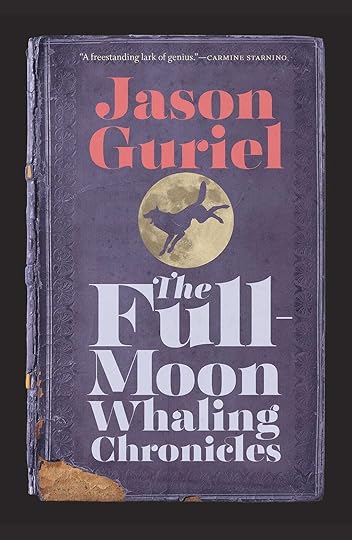 The Full Moon Whaling (Biblioasis, 2023)
The Full Moon Whaling (Biblioasis, 2023)by Jason Guriel
Written, I shit you not, entirely in heroic couplets, Canadian poet Jason Guriel’s The Full Moon Whaling is a 381-page epic that will leave you wondering: What the eff did I just read? Told in sections labeled as “Scrolls” (like those in a captain’s quarters in a schooner), the book’s narrative follows Kaye, “an English literature student searching for the reclusive author of a YA classic — a beloved novel about teenage werewolves sailing to a fabled sea monster’s nest” (from the book’s description.) Sometimes, books seem to make it onto the SFPA Elgin nominee list purely out of how strange and bizarre they are, and this one FOR SURE fits into that category. Part werewolf tale, part Moby Dick pastiche, this one is silly, weird, and somehow imaginable as a movie; this is an absolute blast to read.
 The Gravity of Existence (Interstellar Flight Press, 2022)
The Gravity of Existence (Interstellar Flight Press, 2022)In its second year on the SFPA Elgin Award nominee list, Sng’s haiku collection strings a huge collection of previously published poems together in crowns. Christina Sng is a wizard of the scifaiku or speculative haiku form. Here, Sng has collected many small poems, combining them to great effect. These poems, despite being small, have true depth. The heart and emotion behind them is what stands Sng apart from other speculative haiku poets. It’s not just humor but a deep well of meaning. This one is for you if you love small poems, haiku, and speculative poetry.
Read Archita Mittra’s interview with Christina Sng at Interstellar Flight Magazine.
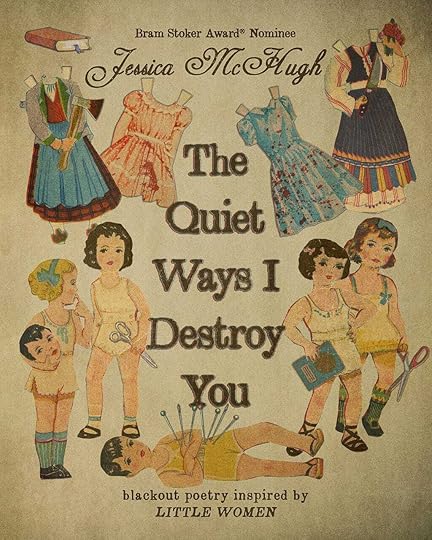 The Quiet Ways I Destroy You: Blackout Poetry Inspired by Louisa May Alcott’s Little Women (Apokrupha, 2023)
The Quiet Ways I Destroy You: Blackout Poetry Inspired by Louisa May Alcott’s Little Women (Apokrupha, 2023)Jessica McHugh’s previous books of erasure poetry, A Complex Accident of Life: Blackout Poetry Inspired by Mary Shelley’s Frankenstein and Strange Nests: Blackout Poetry Inspired by the Secret Garden are valuable additions to the canon of found poetry, and this book is no exception. I was particularly struck by the physical, 3-dimensional approach McHugh takes to blackout poetry here, such as in “So Much To Do”, in which the poet attaches cut-out book page text to a string and wraps it around a crumbled-up ball of paper. Some poems use the cover-up method, such as “Hammered Strawberries”, which uses what appear to be sequins, “Burnt Sugar”, photographed with a fork, knife, and plate, “The Fire In Her”, photographed with live plants, and “Fairy Gifts”, where the page is stitched with yarn. These poems are art (photography and painting) on their own.
Diving into the poems themselves, they paint a far more disturbed and feminist vision of the original text — a necessary subversion of a text that is often painted as cheerful and traditional (due to that ending for its main character Jo, which Greta Gerwig so fatefully reversed). The reader can appreciate the contemporary themes McHugh has brought to this source, one beloved by women worldwide, while also enjoying a feast for the eyes. Frustratingly, delightfully good.
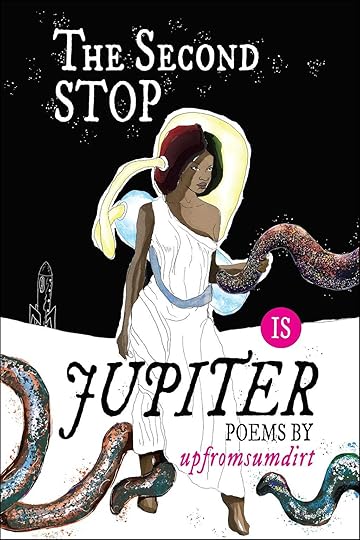 The Second Stop Is Jupiter (Wayne State University Press, 2023)
The Second Stop Is Jupiter (Wayne State University Press, 2023)upfromsumdirt is an afro-surrealist & afro-futurist writing in the style of what he terms “abstract africana.” The first poem in this collection, “The Hero with an African Face” rejects the notion that black men can’t be heroes by acknowledging the work of actors in the SFF space like John Boyega, who bore the brunt of Disney’s commodification of people of color (and harassment because of it). This poem comes from the place of marginalized voices asserting that they, too, have a right to science fiction, fantasy, and horror spaces. These are visceral, rich, campy poems that fly in the face of society’s constraints. Filled with broken lines and ample space on the page, the poems can be read as an epic sequence in “chapters” (Chapter 1: I Don’t Know Who Needs to Hear this But, 2: The Girl with the Frantz Fanon Tatoo, 3: The Underground Rubaiyat).
The second poem in the collection is titled after the poet’s self-created aesthetic, “Abstract Africana”, which describes the poems in the book as “dark poems” that “wobble on axis” and “a beautifully discolored dialog with its pages singed”. upfromsumdirt reimagines folktales like Brer Rabbit, John Henry, and The Wizard of Oz in a wild constellation of poems that are truly a delightful puzzle to read.
Honorable Mentions to Add to Your TBR:As always, I can’t list ALL of the books that I loved in this short space, so I would like to include a list of books you should FOR SURE add to your reading list but that I didn’t get time to review.
Bramah’s Quest (The second in Renée Sarojini Saklikar’s epic (read: very, very, very long) fantasy saga in verse, The Heart of This Journey Bears All Patterns (THOT J BAP), the first of which, Bramah and the Beggar Boy, I reviewed in 2022.) Dreamscapes and Dark Corners by Melissa Ridley ElmesGrab by Kendra Preston Leonard (Interviewed in Interstellar Flight Magazine by T.D. Walker) In Days to Come by Lisa Timpf Infernas by West Ambrose Rivers in Your Skin, Sirens in Your Hair by Marisca Pichette The Spellbook of Fruit and Flowers by Christine Butterworth-McDermott Village by Latasha N. Nevada Diggs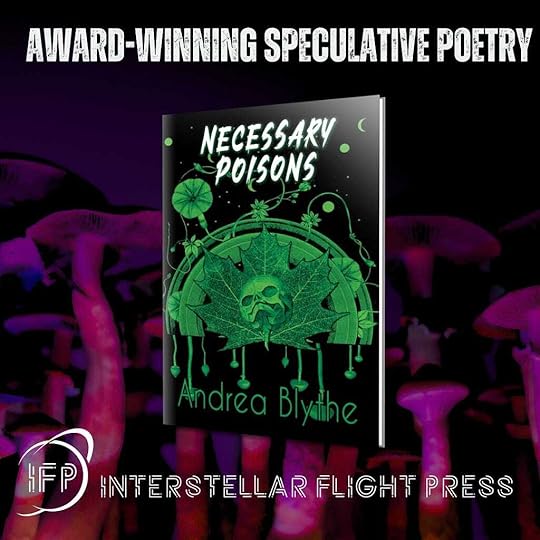
Interstellar Flight Magazine publishes essays on what’s new in the world of speculative genres. In the words of Ursula K. Le Guin, we need “writers who can see alternatives to how we live now, can see through our fear-stricken society and its obsessive technologies to other ways of being, and even imagine real grounds for hope.” Visit our Patreon to join our fan community on Discord. Follow us on Twitter, Facebook, or Instagram.
[image error]The Best Speculative Poetry is Intersectional was originally published in Interstellar Flight Magazine on Medium, where people are continuing the conversation by highlighting and responding to this story.



